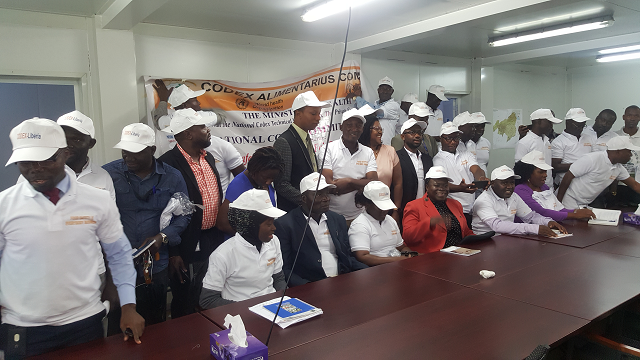A collective effort: Liberia launches National Codex Committee
Every country needs a good policy on food safety legislation.
Liberia launched its National Codex Committee in August of this year in what the Director of County Health Services in the Ministry of Health, Dr. Cuallau Jabbeh Howe described as a 'collective effort'. “Every country needs a good policy on food safety legislation, and the Ministry of Health is working in that direction, because we are charged with the responsibility of protecting our citizens in our borders. There is an urgent need for us to collaborate and make sure that whatever is brought in this country is fit for human consumption,"Dr Howe said.

Launch of National Codex Committee
All parties, including Cultivating New Frontiers in Agriculture/Liberia Agribusiness Development Activity will now be working together to ensure that the National Standards Act and Food Law are adopted. Broader aims include increasing labaoratory standards and improving incomes for small holder farmers producing cassava, rice, vegetable, cocoa or working in aquaculture.
Participation in Codex
The WHO Representative in Liberia Alex Ntale Gasasira siad: "WHO applauds the commitment of the Government of Liberia to food safety and the launch of Liberia's national committee. We welcome the multi-sectoral approach that the Government is promoting and look forward to working with the coalition of bilateral and multilateral partners supporting this important area of work."
FAO Food Safety and Quality Officer Catherine Bessy said: "National Codex Committees are important mechanisms to support inclusiveness and transparency, as key characteristics of a country’s participation in Codex. We hope that Liberia's multi stakeholders deliberations on Codex related matters will increase the use of Codex standards at national level, and enrich Liberia's contribution to international Codex discussions."
Setting priorities

Steve Mambu, Laboratory Director at the National Standards Laboratory in the Ministry of Commerce and Industry spoke to the Codex Secretariat about the background to this launch.
He explained that after the ebola crises there were many questions about food control systems in Liberia including on the role of authorities and concerns about national capacity to deal with food safety issues. There was a perceived lack of a centralised system for coordination and a lack of general awareness on food safety right through to consumers.
The initial one year workplan in Liberia will be to identify which Codex committees to engage in based on national priorities including hygiene, fruits and vegetables, pesticide residues and contaminants.
The National Codex Committee will be raising awareness, building capacity as well as devleoping internal guidance to enhance food safety expertise and knowledge of the Codex system.
A technical committee is currently working to begin the harmonisation process of adopting Codex standards into national legislation by the end of 2017. This coordinated approach will lead to facilitating trade and increasing consumer protection.
At the heart of the Codex mandate are the core values of collaboration, inclusiveness, consensus building and transparency. Governmental and non-governmental, public and private organizations alike play a vital role in ensuring Codex texts are of the highest quality and based on sound science.
Codex would have little authority in the field of international standard setting if it did not welcome and acknowledge the valuable contributions made by observers. Expert technical bodies, industry and consumer associations
contribute to the standard-setting process in a spirit of openness, collaboration and transparency.
Intergovernmental organizations (IGOs) and international non-governmental organizations (NGOs) can apply for observer status in Codex in order to attend and put forward their views at every stage of the standard-setting process.
 Current Codex Alimentarius Commission
Current Codex Alimentarius Commission
A collective effort: Liberia launches National Codex Committee
Every country needs a good policy on food safety legislation.
Liberia launched its National Codex Committee in August of this year in what the Director of County Health Services in the Ministry of Health, Dr. Cuallau Jabbeh Howe described as a 'collective effort'. “Every country needs a good policy on food safety legislation, and the Ministry of Health is working in that direction, because we are charged with the responsibility of protecting our citizens in our borders. There is an urgent need for us to collaborate and make sure that whatever is brought in this country is fit for human consumption,"Dr Howe said.

Launch of National Codex Committee
All parties, including Cultivating New Frontiers in Agriculture/Liberia Agribusiness Development Activity will now be working together to ensure that the National Standards Act and Food Law are adopted. Broader aims include increasing labaoratory standards and improving incomes for small holder farmers producing cassava, rice, vegetable, cocoa or working in aquaculture.
Participation in Codex
The WHO Representative in Liberia Alex Ntale Gasasira siad: "WHO applauds the commitment of the Government of Liberia to food safety and the launch of Liberia's national committee. We welcome the multi-sectoral approach that the Government is promoting and look forward to working with the coalition of bilateral and multilateral partners supporting this important area of work."
FAO Food Safety and Quality Officer Catherine Bessy said: "National Codex Committees are important mechanisms to support inclusiveness and transparency, as key characteristics of a country’s participation in Codex. We hope that Liberia's multi stakeholders deliberations on Codex related matters will increase the use of Codex standards at national level, and enrich Liberia's contribution to international Codex discussions."
Setting priorities

Steve Mambu, Laboratory Director at the National Standards Laboratory in the Ministry of Commerce and Industry spoke to the Codex Secretariat about the background to this launch.
He explained that after the ebola crises there were many questions about food control systems in Liberia including on the role of authorities and concerns about national capacity to deal with food safety issues. There was a perceived lack of a centralised system for coordination and a lack of general awareness on food safety right through to consumers.
The initial one year workplan in Liberia will be to identify which Codex committees to engage in based on national priorities including hygiene, fruits and vegetables, pesticide residues and contaminants.
The National Codex Committee will be raising awareness, building capacity as well as devleoping internal guidance to enhance food safety expertise and knowledge of the Codex system.
A technical committee is currently working to begin the harmonisation process of adopting Codex standards into national legislation by the end of 2017. This coordinated approach will lead to facilitating trade and increasing consumer protection.
 Codex and Observer
Codex and Observer
around the world since ancient times.
We might not always know where it comes from,
but we expect it to be available, safe and of good quality.










Leave a comment